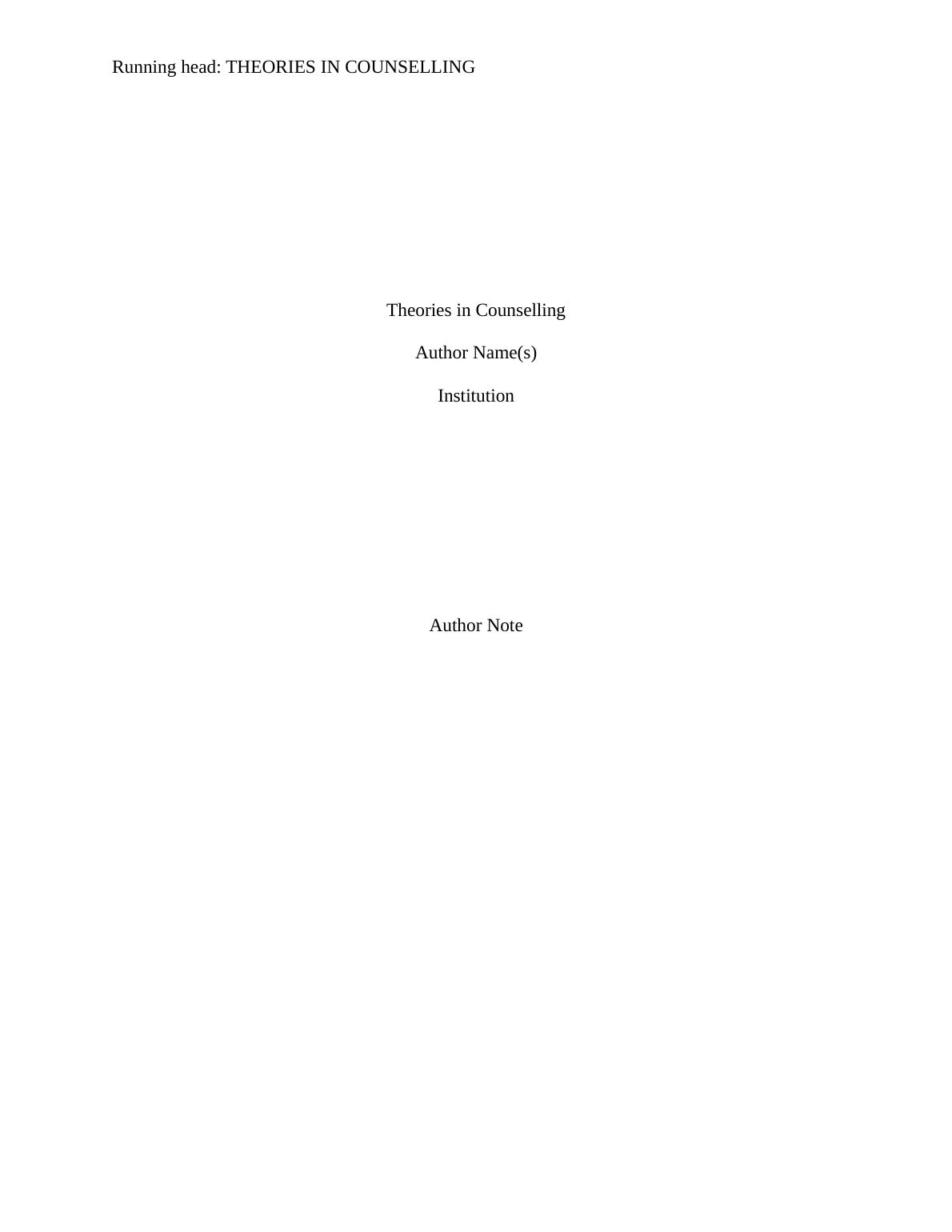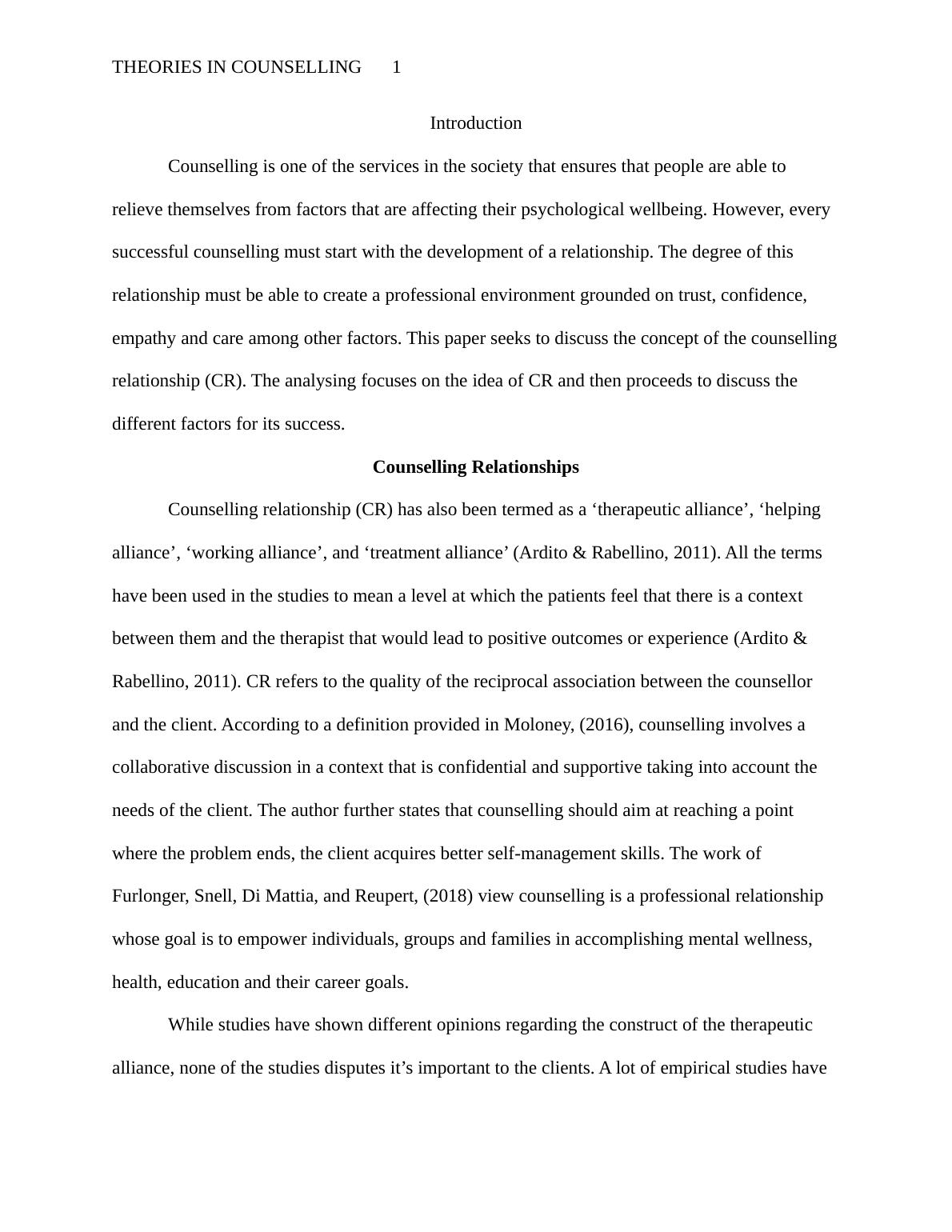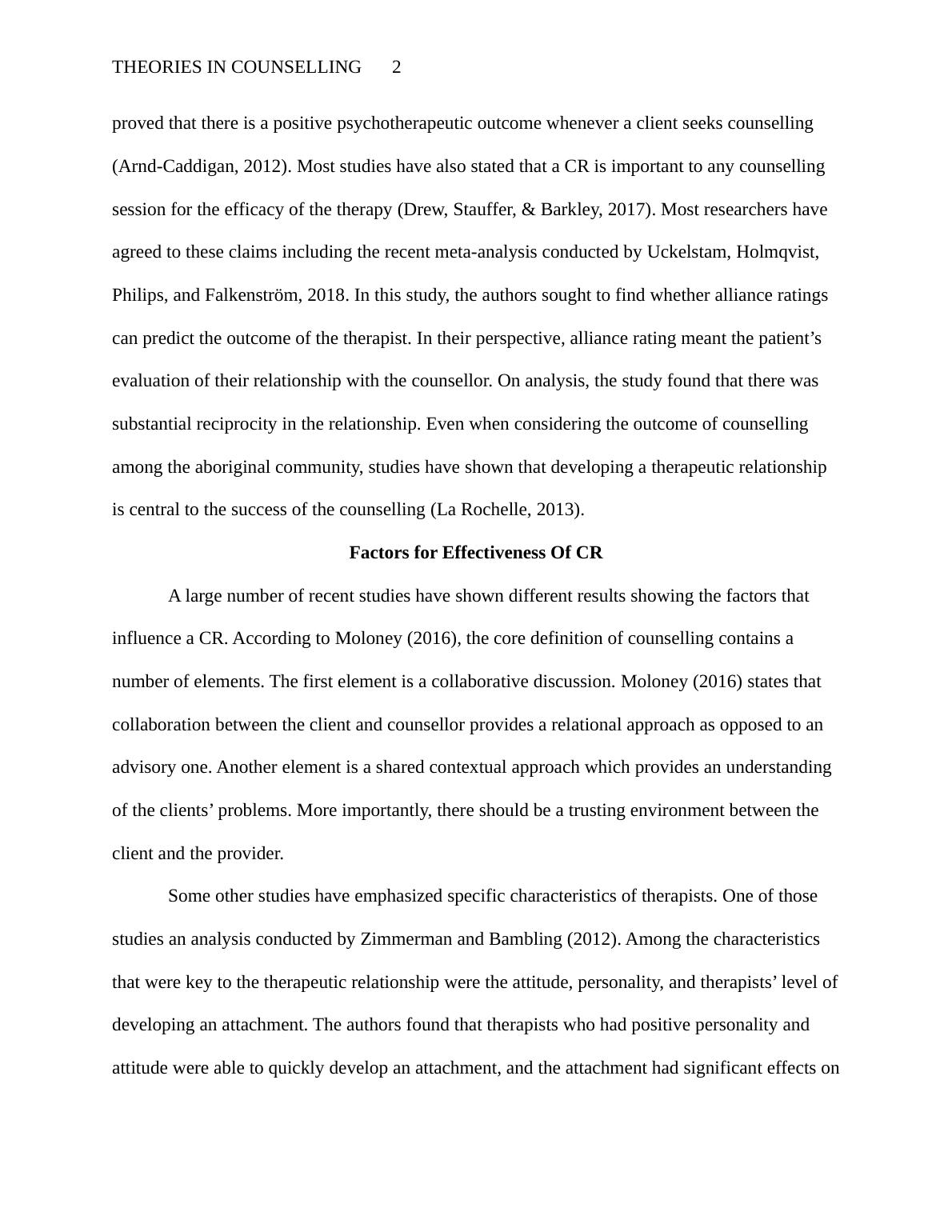theories in counselling8.
Added on 2022-10-01
7 Pages1677 Words6 Views
Running head: THEORIES IN COUNSELLING
Theories in Counselling
Author Name(s)
Institution
Author Note
Theories in Counselling
Author Name(s)
Institution
Author Note

THEORIES IN COUNSELLING 1
Introduction
Counselling is one of the services in the society that ensures that people are able to
relieve themselves from factors that are affecting their psychological wellbeing. However, every
successful counselling must start with the development of a relationship. The degree of this
relationship must be able to create a professional environment grounded on trust, confidence,
empathy and care among other factors. This paper seeks to discuss the concept of the counselling
relationship (CR). The analysing focuses on the idea of CR and then proceeds to discuss the
different factors for its success.
Counselling Relationships
Counselling relationship (CR) has also been termed as a ‘therapeutic alliance’, ‘helping
alliance’, ‘working alliance’, and ‘treatment alliance’ (Ardito & Rabellino, 2011). All the terms
have been used in the studies to mean a level at which the patients feel that there is a context
between them and the therapist that would lead to positive outcomes or experience (Ardito &
Rabellino, 2011). CR refers to the quality of the reciprocal association between the counsellor
and the client. According to a definition provided in Moloney, (2016), counselling involves a
collaborative discussion in a context that is confidential and supportive taking into account the
needs of the client. The author further states that counselling should aim at reaching a point
where the problem ends, the client acquires better self-management skills. The work of
Furlonger, Snell, Di Mattia, and Reupert, (2018) view counselling is a professional relationship
whose goal is to empower individuals, groups and families in accomplishing mental wellness,
health, education and their career goals.
While studies have shown different opinions regarding the construct of the therapeutic
alliance, none of the studies disputes it’s important to the clients. A lot of empirical studies have
Introduction
Counselling is one of the services in the society that ensures that people are able to
relieve themselves from factors that are affecting their psychological wellbeing. However, every
successful counselling must start with the development of a relationship. The degree of this
relationship must be able to create a professional environment grounded on trust, confidence,
empathy and care among other factors. This paper seeks to discuss the concept of the counselling
relationship (CR). The analysing focuses on the idea of CR and then proceeds to discuss the
different factors for its success.
Counselling Relationships
Counselling relationship (CR) has also been termed as a ‘therapeutic alliance’, ‘helping
alliance’, ‘working alliance’, and ‘treatment alliance’ (Ardito & Rabellino, 2011). All the terms
have been used in the studies to mean a level at which the patients feel that there is a context
between them and the therapist that would lead to positive outcomes or experience (Ardito &
Rabellino, 2011). CR refers to the quality of the reciprocal association between the counsellor
and the client. According to a definition provided in Moloney, (2016), counselling involves a
collaborative discussion in a context that is confidential and supportive taking into account the
needs of the client. The author further states that counselling should aim at reaching a point
where the problem ends, the client acquires better self-management skills. The work of
Furlonger, Snell, Di Mattia, and Reupert, (2018) view counselling is a professional relationship
whose goal is to empower individuals, groups and families in accomplishing mental wellness,
health, education and their career goals.
While studies have shown different opinions regarding the construct of the therapeutic
alliance, none of the studies disputes it’s important to the clients. A lot of empirical studies have

THEORIES IN COUNSELLING 2
proved that there is a positive psychotherapeutic outcome whenever a client seeks counselling
(Arnd-Caddigan, 2012). Most studies have also stated that a CR is important to any counselling
session for the efficacy of the therapy (Drew, Stauffer, & Barkley, 2017). Most researchers have
agreed to these claims including the recent meta-analysis conducted by Uckelstam, Holmqvist,
Philips, and Falkenström, 2018. In this study, the authors sought to find whether alliance ratings
can predict the outcome of the therapist. In their perspective, alliance rating meant the patient’s
evaluation of their relationship with the counsellor. On analysis, the study found that there was
substantial reciprocity in the relationship. Even when considering the outcome of counselling
among the aboriginal community, studies have shown that developing a therapeutic relationship
is central to the success of the counselling (La Rochelle, 2013).
Factors for Effectiveness Of CR
A large number of recent studies have shown different results showing the factors that
influence a CR. According to Moloney (2016), the core definition of counselling contains a
number of elements. The first element is a collaborative discussion. Moloney (2016) states that
collaboration between the client and counsellor provides a relational approach as opposed to an
advisory one. Another element is a shared contextual approach which provides an understanding
of the clients’ problems. More importantly, there should be a trusting environment between the
client and the provider.
Some other studies have emphasized specific characteristics of therapists. One of those
studies an analysis conducted by Zimmerman and Bambling (2012). Among the characteristics
that were key to the therapeutic relationship were the attitude, personality, and therapists’ level of
developing an attachment. The authors found that therapists who had positive personality and
attitude were able to quickly develop an attachment, and the attachment had significant effects on
proved that there is a positive psychotherapeutic outcome whenever a client seeks counselling
(Arnd-Caddigan, 2012). Most studies have also stated that a CR is important to any counselling
session for the efficacy of the therapy (Drew, Stauffer, & Barkley, 2017). Most researchers have
agreed to these claims including the recent meta-analysis conducted by Uckelstam, Holmqvist,
Philips, and Falkenström, 2018. In this study, the authors sought to find whether alliance ratings
can predict the outcome of the therapist. In their perspective, alliance rating meant the patient’s
evaluation of their relationship with the counsellor. On analysis, the study found that there was
substantial reciprocity in the relationship. Even when considering the outcome of counselling
among the aboriginal community, studies have shown that developing a therapeutic relationship
is central to the success of the counselling (La Rochelle, 2013).
Factors for Effectiveness Of CR
A large number of recent studies have shown different results showing the factors that
influence a CR. According to Moloney (2016), the core definition of counselling contains a
number of elements. The first element is a collaborative discussion. Moloney (2016) states that
collaboration between the client and counsellor provides a relational approach as opposed to an
advisory one. Another element is a shared contextual approach which provides an understanding
of the clients’ problems. More importantly, there should be a trusting environment between the
client and the provider.
Some other studies have emphasized specific characteristics of therapists. One of those
studies an analysis conducted by Zimmerman and Bambling (2012). Among the characteristics
that were key to the therapeutic relationship were the attitude, personality, and therapists’ level of
developing an attachment. The authors found that therapists who had positive personality and
attitude were able to quickly develop an attachment, and the attachment had significant effects on

End of preview
Want to access all the pages? Upload your documents or become a member.
Related Documents
Important Qualities of a Therapist: Congruence, Unconditional Positive Regard, Empathetic Understanding, Multicultural Awareness, and Self-Reflectionlg...
|12
|2485
|249
The Counselling Relationship | Assessmentlg...
|7
|1718
|20
Ways Counsellor's Qualities and Counselling Relationship Contribute to Successful Outcomes in Therapylg...
|9
|2017
|86
Rapport: A key to treatment successlg...
|4
|3045
|333
Counselling Relationshiplg...
|6
|1377
|148
Therapeutic Alliance in Counsellinglg...
|11
|3378
|81
